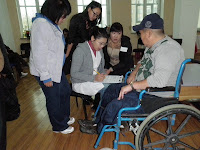Elder and Sister Brown (34 years a practicing physical therapist) and Sister Misha Bradford (Professor of Physical Therapy at University of Utah) came from Utah, USA to do training for 31 physical therapist from all 22 aimags (provinces) in Mongolia. They trained in how to fit a person in a wheelchair to comply with World Health request that we “do no harm” in giving away wheelchairs. Deseret International Charities (DIC) furnished 266 wheelchairs in 2 styles, each style with 4 different sizes. DIC will provide approximately 500 more wheelchairs in two shipments in the next 8 months to be given to the National Rehabilitation Center and Social Welfare.
The participant physical therapists learned about the 7 different kinds of wheelchairs that are available and which kind might be better for a specific patient. At this time, DIC only provides the Harmony (Standard hospital style) and Rough Rider.
 The participants learned how to properly lift someone so neither patient or doctor is injured or hurt.
The participants learned how to properly lift someone so neither patient or doctor is injured or hurt.
 .Assessing a patient involves a lot of specific questions in order to match the patient's lifestyle and physical abilities, to the proper type and size of wheelchair.
.Assessing a patient involves a lot of specific questions in order to match the patient's lifestyle and physical abilities, to the proper type and size of wheelchair.Both directors of the National Rehabilitation Center (NRC) and the Social Welfare Department came to the opening and closing ceremonies. They both supported the training and was proud of the participants. They were amazed at the different aspects of training and are so thankful for the doctors taking their time to volunteer their time to come to Mongolia and share their knowledge.
Getting the wheelchairs through customs was a daunting task for Social Welfare, but persistence pays and we were finally able to have the chairs released the day before the final fitting to recipients. It was a monumental effort on many volunteers who helped move the chairs to transport vehicles, haul them up to the 2nd and 3rd floor of the National Rehabilitation Center or to the Social Welfare Department. The final hurdle was to assemble enough Rough Rider chairs for the recipients to take home with them the next day. With a lot of prayers and Pizza for fuel we were ready for the Saturday fitting day and the dozens of patients scheduled to come to the NRC.
I guessed we would get 30 on a truck at most - They took 50 plus several boxes of seat cushions on each truck so we only needed one trip to NRC. The one truck going to Social Welfare was much bigger and took all their chairs in two loads.
The Rough Rider is a chair with larger front wheels and a little lower center of gravity to handle the uneven terrain and rough riding conditions. The current orders are for more of this style which will much more practical for travel on dirt roads, paths, curbs and other common obstacles what wheelchair riders experience daily. Handicap friendly buildings or homes are a rarity
This sweet lady was the first one there promptly at 9:00 AM. She borrowed a wheelchair from a friend and moved herself over three miles over the normal rough roads and sidewalks to get to the NRC. She didn't complain even though one of the front wheels kept falling off the borrowed chair on the way to the NRC and she had to keep stopping to put it back on. We asked her how she intended to get back home and she just said that she would push the borrowed wheelchair ahead of her new Rough Rider and just go home. When DIC offered to pay for her taxi home, she just got teary eyed and kept saying thank you, thank you.

The National Rehabilitation center teaches individuals many different skills (sewing, gardening, physical therapy and traditional sewing with felt) and including cooking/catering. We contracted with the school to have the students furnish the meals to the participants, teachers and leaders during the training. The Doctors were concerned that they might not experience Mongolian cuisine during their visit, but they ate some of the best that week.

















